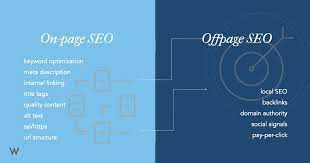The Importance of On-Page SEO
Search Engine Optimization (SEO) is a crucial aspect of digital marketing that helps websites rank higher in search engine results pages. While off-page SEO factors like backlinks play a significant role in improving a website’s visibility, on-page SEO is equally important.
On-page SEO refers to the optimization of individual web pages to improve their search engine rankings and drive organic traffic. By focusing on on-page elements such as content, meta tags, headings, and internal links, website owners can enhance their site’s relevance and authority in the eyes of search engines.
Key Components of On-Page SEO:
- Keyword Optimization: Including relevant keywords in title tags, meta descriptions, headings, and body content helps search engines understand the context of a page.
- Quality Content: Creating high-quality, engaging content that provides value to users can improve dwell time and increase the likelihood of earning backlinks.
- Title Tags and Meta Descriptions: Crafting compelling title tags and meta descriptions can boost click-through rates from search engine results pages.
- Internal Linking: Linking to other relevant pages within your website helps search engines crawl and index your content more effectively.
Benefits of On-Page SEO:
Effective on-page SEO practices offer several benefits for website owners:
- Improved Search Engine Rankings: Optimizing on-page elements can help websites rank higher for targeted keywords.
- Enhanced User Experience: By providing valuable content and easy navigation, on-page SEO contributes to a positive user experience.
- Increase in Organic Traffic: Higher rankings in search results can lead to increased organic traffic to your website.
- Better Conversion Rates: Relevant content and optimized calls-to-action can drive conversions and generate leads.
In conclusion, on-page SEO plays a critical role in improving a website’s visibility, driving organic traffic, and enhancing user experience. By implementing best practices and staying updated with algorithm changes, website owners can position their sites for success in the competitive online landscape.
“Demystifying SEO: Technical, On-Page, and Off-Page Differences Explained”
3. “Exploring the Fundamentals of Page-Level SEO
- What is an off-page SEO technical audit?
- What is technical SEO vs off-page vs on-page?
- What is a page SEO?
- What is offpage SEO?
What is an off-page SEO technical audit?
An off-page SEO technical audit involves evaluating external factors that impact a website’s search engine rankings and overall online presence. This audit focuses on analyzing backlinks, domain authority, social signals, and other off-site elements that influence a website’s credibility and authority in the eyes of search engines. By conducting an off-page SEO technical audit, digital marketers can identify areas for improvement, address potential issues with backlink quality or relevancy, and develop strategies to enhance the website’s off-site optimization efforts for better search engine visibility and organic traffic growth.
What is technical SEO vs off-page vs on-page?
Technical SEO, off-page SEO, and on-page SEO are three essential components of a comprehensive search engine optimization strategy. Technical SEO focuses on optimizing the technical aspects of a website to improve its crawlability, indexability, and overall performance in search engines. This includes factors like site speed, mobile-friendliness, structured data markup, and URL structure. On the other hand, off-page SEO involves external factors such as backlinks, social signals, and online reputation management to enhance a website’s authority and credibility. On-page SEO, meanwhile, deals with optimizing individual web pages through content creation, keyword optimization, meta tags, and internal linking to improve their relevance and visibility in search results. Each of these aspects plays a crucial role in helping websites rank higher in search engine results pages and attract organic traffic.
What is a page SEO?
On-page SEO refers to the optimization techniques implemented directly on individual web pages to improve their search engine rankings and visibility. This includes optimizing various on-page elements such as content, meta tags, headings, internal links, and image alt text to make the page more relevant and authoritative in the eyes of search engines. By strategically incorporating relevant keywords, creating high-quality content, and structuring the page for optimal user experience, on-page SEO aims to attract organic traffic and enhance a website’s overall performance in search engine results pages.
What is offpage SEO?
Off-page SEO refers to the optimization efforts that take place outside of a website to improve its search engine rankings and visibility. Unlike on-page SEO, which focuses on optimizing elements within a website itself, off-page SEO revolves around building backlinks, social signals, and online reputation. Off-page SEO techniques aim to increase a website’s authority, credibility, and relevance in the eyes of search engines by establishing connections with other reputable websites and driving traffic from external sources. By leveraging off-page SEO strategies effectively, website owners can enhance their online presence and attract more organic traffic to their site.

